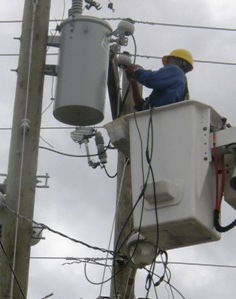CUC earnings fall
 (CNS): A change in the reporting period, a reduction in customer rates, the weather, the loss of the Hurricane Ivan surcharge and other reasons were offered by CUC this week by way explanation for a 47% decrease in net earnings. While the CUC share price had been steadily increasing over the past few yeas, during 2008 the price fell to its lowest ever. The company said that in anticipation of an economic downturn and escalating fuel prices, it had projected reduced sales growth for the 2008 Transitional Period compared to prior periods.
(CNS): A change in the reporting period, a reduction in customer rates, the weather, the loss of the Hurricane Ivan surcharge and other reasons were offered by CUC this week by way explanation for a 47% decrease in net earnings. While the CUC share price had been steadily increasing over the past few yeas, during 2008 the price fell to its lowest ever. The company said that in anticipation of an economic downturn and escalating fuel prices, it had projected reduced sales growth for the 2008 Transitional Period compared to prior periods.
Announcing its audited results for the eight-month period ended December 31, 2008 – the transitional period – following the change in the firm’s financial year-end from April 30 to December 31, CUC said earnings were negatively impacted by consumer rate reductions, the removal of the Hurricane Ivan Cost Recovery Surcharge, both implemented in January of 2008, and unseasonably cool and wet conditions during the last two months of the period.
During theperiod, the Company also began to see slowing demand growth arising from the deteriorating worldwide economic conditions and their effect on Grand Cayman. Net earnings for the transitional period were $12.6 million, or $0.45 per Class A Ordinary Share, which it said was in-line with the company’s expectations.
Kilowatt hours (kWh) sales for the period grew by 2% to 376.6 million kWh from 368.4 million kWh for the eight month period ended 31 December 2007. The system peak of 93.8 Megawatts achieved in September 2008 grew 1.2% over the summer 2007 peak.
“During the transitional period, CUC focused its capital expenditure program, totalling $27.8 million on priority projects in view of the deteriorating economic conditions,” said Richard Hew, CUC’s President and CEO. The company funded capital expenditures using the proceeds of the $28 million Class A Ordinary Share rights offering completed in August 2008. The offering also served to strengthen the company’s balance sheet. The company continued to focus on reducing controllable operating expenditures.
“In the transitional period we devoted significant effort to the advancement of renewable energy with our wind initiative moving towards a request for proposal stage. The company, in conjunction with the Electricity Regulatory Authority, also announced approval of the Consumer-Owned Renewable Energy programme,” Hew added.
Reliability of service to customers as measured by the Average Service Availability Index (ASAI) remained high 99.95% for the transitional period compared to 99.96 % for the previous year.
Category: Business

